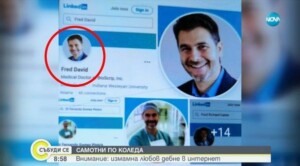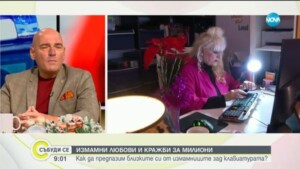Love Scams: Foreigners Lie to Bulgarian Women on the Internet
Authors:
• Julian Stoyanov, Nova Broadcasting Group Ltd.
• Lydia Zagarova – Psychologist
Love Scams Target Bulgarian Women To Steal Their Money, Break Their Hearts, and Destroy Their Trust – Leaving Them Traumatized
Translated from Bulgarian
The Love Scam Victim’s Story of Lydia Zagarova from Bulgaria.
How the Love Scams Scheme Works
Every year more and more Bulgarian women become victims of romantic love scams. At Christmas, the number of lonely hearts increases.
Five years ago, Lydia Zagarova posted photos on Facebook. Immediately afterward, a stranger likes them and asks her for friendship.
Her Love Scam Suitor was Gomez Robinson
She describes him as a handsome and charming man with a radiance. He said he was a military doctor on a mission in Yemen. “A passionate, loving correspondence began. It was full of love bombs, promises, and wishes for marriage. Who doesn’t want to be showered with love? But that’s what’s suspicious,” the deceived love scammed woman commented.
Her Suspicion becomes a Thorough Investigation
After days of kind words, promises, and declarations of love, she understands that this is all manipulation, all just a love scam and she was a scam victim. She discovers that Gomez also introduces himself as Adisu Willies. She also found him by the name of Fred David. Different Facebook accounts – one stolen identity of Dr. Fernando Gomes Pinto from Brazil.
Then came the Requests for Money
The love scammer asked her for $100,000, which she had to transfer to an American account. Lydia managed to get out of the love scam emotional trap in time, but according to the police, every month at least two Bulgarian women give tens of thousands of euros in the name of love. [SCARS estimates it to be closer to 2,000]
The goal is to financially help a newfound passion that turns out to be not an American lieutenant or surgeon, but a fake profile love scammer from Nigeria.
“These love scams have been in Bulgaria for years and will remain for many more years. The term for these crimes is romantic fraud/love scams/romance scams/relationship scams. Women are carefully selected – who have social media photos of them alone or with a pet, a flower, which is an indicator that she has no family, ” said cybersecurity expert Vladimir Dimitrov.
Thus begins the Grooming and Manipulation of the Single Lady Targeted
“They write loving sexual lines, imitations of intimate acts. They are very convincing in this. They groan, they groan, they imitate sex,” Lydia said. The traps of love scam deceptive suitors can be varied, such as sendingt them gifts too.
As a part of the love scam they say “the courier firm says the shipment was stopped by Swiss customs, and a million dollars were found inside bills and the victim has two options: either pay a fee or be arrested for money laundering.” We’ve had victims come up to us and say, “Officer Georgiev is waiting for us at the airport to get $1 million. Come with me.” It’s all a scam,” Dimitrov explains.
Having burned herself on her love scam, Lydia began her mission to help other women in a similar situation. She is not ashamed to speak out and believes that the stigma in Bulgaria gets in the way of deceived women scam victims to be able to recover and move on.
“Anyone can become a victim of romantic deception or love scam. We can’t stigmatize. We shouldn’t make fun of. We don’t know tomorrow if this will happen to our daughter, to our mother, to our grandmother,” she said.
Lydia Zagarova, SCARS Director
Lydia is a psychologist, a member of the SCARS Board of Directors, and a Psychology Advisor to SCARS.
More:
- Dr. Fernando Gomes Pinto: Do You Know Him? Another Stolen Face / Stolen Identity (romancescamsnow.com)
- Любовни измами: Чужденци масово лъжат българки в интернет – Общество – Светът – Събуди се – Nova.bg
- SCARS Webinar: Romance Scams Life Cycle on YouTube
- SCARS Webinar: Romance Scams #1 – Pig Butchering Fraud & Military Impersonation Fraud on YouTube
- Military Impersonation Scams – Article Catalog (romancescamsnow.com)
SCARS Resources:
- For New Victims of Relationship Scams newvictim.AgainstScams.org
- Subscribe to SCARS Newsletter newsletter.againstscams.org
- Sign up for SCARS professional support & recovery groups, visit support.AgainstScams.org
- Find competent trauma counselors or therapists, visit counseling.AgainstScams.org
- Become a SCARS Member and get free counseling benefits, visit membership.AgainstScams.org
- Report each and every crime, learn how to at reporting.AgainstScams.org
- Learn more about Scams & Scammers at RomanceScamsNOW.com and ScamsNOW.com
- Global Cyber Alliance ACT Cybersecurity Tool Website: Actionable Cybersecurity Tools (ACT) (globalcyberalliance.org)
- Self-Help Books for Scam Victims are at shop.AgainstScams.org
- Donate to SCARS and help us help others at donate.AgainstScams.org
- Worldwide Crisis Hotlines: International Suicide Hotlines – OpenCounseling : OpenCounseling
- Campaign To End Scam Victim Blaming – 2024 (scamsnow.com)
More ScamsNOW.com Articles
-/ 30 /-
What do you think about this?
Please share your thoughts in a comment below!
SCARS LINKS: AgainstScams.org RomanceScamsNOW.com ContraEstafas.org ScammerPhotos.com Anyscam.com ScamsNOW.com
reporting.AgainstScams.org support.AgainstScams.org membership.AgainstScams.org donate.AgainstScams.org shop.AgainstScams.org
youtube.AgainstScams.org linkedin.AgainstScams.org facebook.AgainstScams.org
Important Information for New Scam Victims
- Please visit www.ScamVictimsSupport.org – a SCARS Website for New Scam Victims & Sextortion Victims.
- SCARS Institute now offers its free, safe, and private Scam Survivor’s Support Community at www.SCARScommunity.org – this is not on a social media platform, it is our own safe & secure platform created by the SCARS Institute especially for scam victims & survivors.
- SCARS Institute now offers a free recovery learning program at www.SCARSeducation.org.
- Please visit www.ScamPsychology.org – to more fully understand the psychological concepts involved in scams and scam victim recovery.
If you are looking for local trauma counselors, please visit counseling.AgainstScams.org
If you need to speak with someone now, you can dial 988 or find phone numbers for crisis hotlines all around the world here: www.opencounseling.com/suicide-hotlines
Statement About Victim Blaming
Some of our articles discuss various aspects of victims. This is both about better understanding victims (the science of victimology) and their behaviors and psychology. This helps us to educate victims/survivors about why these crimes happened and not to blame themselves, better develop recovery programs, and help victims avoid scams in the future. At times, this may sound like blaming the victim, but it does not blame scam victims; we are simply explaining the hows and whys of the experience victims have.
These articles, about the Psychology of Scams or Victim Psychology – meaning that all humans have psychological or cognitive characteristics in common that can either be exploited or work against us – help us all to understand the unique challenges victims face before, during, and after scams, fraud, or cybercrimes. These sometimes talk about some of the vulnerabilities the scammers exploit. Victims rarely have control of them or are even aware of them, until something like a scam happens, and then they can learn how their mind works and how to overcome these mechanisms.
Articles like these help victims and others understand these processes and how to help prevent them from being exploited again or to help them recover more easily by understanding their post-scam behaviors. Learn more about the Psychology of Scams at www.ScamPsychology.org
SCARS INSTITUTE RESOURCES:
If You Have Been Victimized By A Scam Or Cybercrime
♦ If you are a victim of scams, go to www.ScamVictimsSupport.org for real knowledge and help
♦ SCARS Institute now offers its free, safe, and private Scam Survivor’s Support Community at www.SCARScommunity.org/register – this is not on a social media platform, it is our own safe & secure platform created by the SCARS Institute especially for scam victims & survivors.
♦ Enroll in SCARS Scam Survivor’s School now at www.SCARSeducation.org
♦ To report criminals, visit https://reporting.AgainstScams.org – we will NEVER give your data to money recovery companies like some do!
♦ Follow us and find our podcasts, webinars, and helpful videos on YouTube: https://www.youtube.com/@RomancescamsNowcom
♦ Learn about the Psychology of Scams at www.ScamPsychology.org
♦ Dig deeper into the reality of scams, fraud, and cybercrime at www.ScamsNOW.com and www.RomanceScamsNOW.com
♦ Scam Survivor’s Stories: www.ScamSurvivorStories.org
♦ For Scam Victim Advocates visit www.ScamVictimsAdvocates.org
♦ See more scammer photos on www.ScammerPhotos.com
You can also find the SCARS Institute’s knowledge and information on Facebook, Instagram, X, LinkedIn, and TruthSocial
Psychology Disclaimer:
All articles about psychology and the human brain on this website are for information & education only
The information provided in this and other SCARS articles are intended for educational and self-help purposes only and should not be construed as a substitute for professional therapy or counseling.
Note about Mindfulness: Mindfulness practices have the potential to create psychological distress for some individuals. Please consult a mental health professional or experienced meditation instructor for guidance should you encounter difficulties.
While any self-help techniques outlined herein may be beneficial for scam victims seeking to recover from their experience and move towards recovery, it is important to consult with a qualified mental health professional before initiating any course of action. Each individual’s experience and needs are unique, and what works for one person may not be suitable for another.
Additionally, any approach may not be appropriate for individuals with certain pre-existing mental health conditions or trauma histories. It is advisable to seek guidance from a licensed therapist or counselor who can provide personalized support, guidance, and treatment tailored to your specific needs.
If you are experiencing significant distress or emotional difficulties related to a scam or other traumatic event, please consult your doctor or mental health provider for appropriate care and support.
Also read our SCARS Institute Statement about Professional Care for Scam Victims – click here
If you are in crisis, feeling desperate, or in despair, please call 988 or your local crisis hotline – international numbers here.
More ScamsNOW.com Articles
A Question of Trust
At the SCARS Institute, we invite you to do your own research on the topics we speak about and publish. Our team investigates the subject being discussed, especially when it comes to understanding the scam victims-survivors’ experience. You can do Google searches, but in many cases, you will have to wade through scientific papers and studies. However, remember that biases and perspectives matter and influence the outcome. Regardless, we encourage you to explore these topics as thoroughly as you can for your own awareness.






























![NavyLogo@4x-81[1] Love Scams: Foreigners Lie to Bulgarian Women on the Internet - 2023](https://scamsnow.com/wp-content/uploads/2025/04/NavyLogo@4x-811.png)
![scars-institute[1] Love Scams: Foreigners Lie to Bulgarian Women on the Internet - 2023](https://scamsnow.com/wp-content/uploads/2025/04/scars-institute1.png)

![niprc1.png1_-150×1501-1[1] Love Scams: Foreigners Lie to Bulgarian Women on the Internet - 2023](https://scamsnow.com/wp-content/uploads/2025/04/niprc1.png1_-150x1501-11.webp)